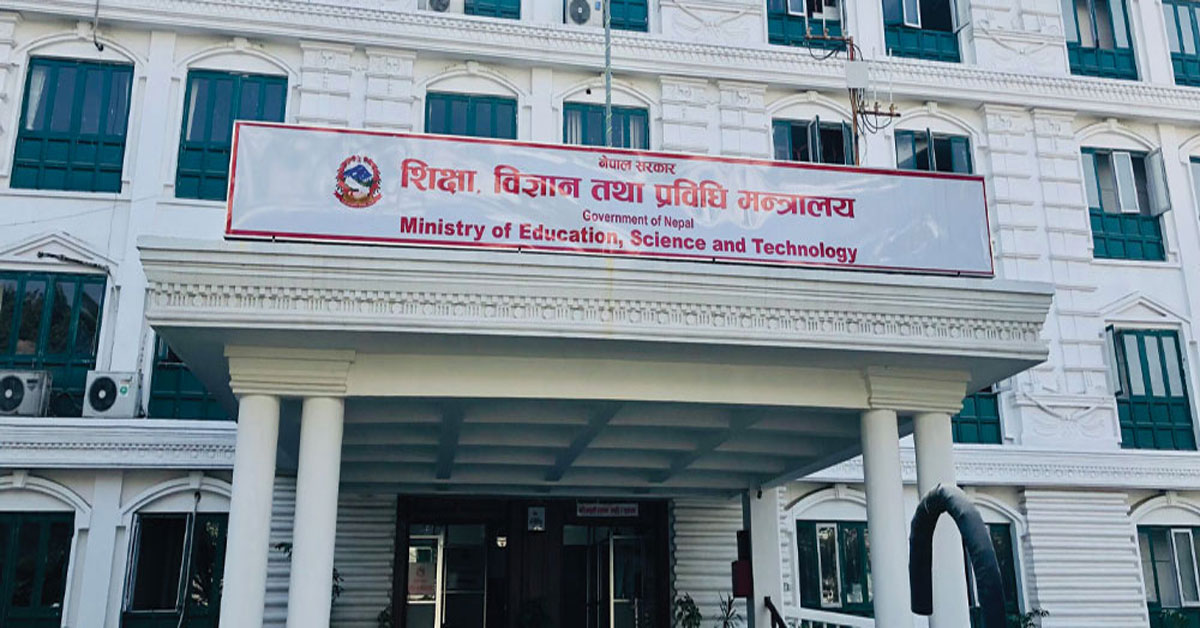
Drafting of the Science and Technology Act 2082
The Ministry of Education, Science, and Technology has prepared the draft bill of the Science and Technology Act 2082. The draft, forwarded to the Ministry of Finance for necessary opinions and suggestions, proposes to dissolve the existing Ministry of Science and Technology.
Currently, science and technology fall under the Ministry of Education, Science, and Technology. Initially, the Ministry of Science and Technology was established separately in 2053 B.S., but in 2075 B.S. it was merged into the Ministry of Education. In the bill prepared by the same ministry, there is also an agreement between the minister and the secretary to separate the responsibilities of science and technology. After receiving feedback from the Ministry of Finance, the draft will be sent to the Ministry of Law.
Next Step of the Bill
Once reviewed and returned by the Ministry of Law, the bill will be amended as necessary and then submitted to the Council of Ministers. After approval by the Council of Ministers, the Minister of Education, Science, and Technology will table it in the Parliament.
According to the proposed bill, in place of the Ministry of Science and Technology, a National Council for Science, Technology, and Innovation will be established under the chairmanship of the Prime Minister.
Composition of the Proposed National Council
The Council will include the following members:
-
Prime Minister (Chairperson)
-
Minister of Finance
-
Minister of Education
-
Minister of Agriculture and Livestock Development
-
Minister of Forests and Environment
-
Minister of Health and Population
-
Minister of Industry, Commerce, and Supplies
-
Chief Ministers of all seven provinces
In addition, representatives from universities, the Federation of Nepalese Chambers of Commerce and Industry, and other stakeholders will also participate. The council will have a total of 40 members.
Formation of the Executive Committee
To implement assigned duties, responsibilities, and authority, and to oversee the management of the entire science and technology sector, an Executive Committee will be formed with executive powers.
-
The Chief Scientific Advisor to the Prime Minister will act as the Coordinator of this committee.
-
The Advisor will carry responsibilities currently handled by the minister.
-
The committee will also include secretaries from the Office of the Prime Minister and the Council of Ministers, and the Ministry of Finance, along with the Member-Secretary of the University Grants Commission, experts, and nine members in total.
Responsibilities of the Executive Committee
The bill proposes that the Executive Committee will:
-
Conduct research and innovation-focused activities for technology, entrepreneurship, production, and productivity growth.
-
Operate research and innovation-related activities among public, private, academic, and professional sectors.
Appointment of the Chief Scientific Advisor
Until now, there has been no practice of appointing a Chief Scientific Advisor to the Prime Minister. However, if the bill becomes law, the Council of Ministers will appoint one with benefits equivalent to a State Minister.
Recommendation Committee for Member Appointments
For the appointment of other members of the Executive Committee, a Recommendation Committee will be formed under the chairmanship of the Chairperson or a member of the Public Service Commission.
It will also include one member designated by the Council Chairperson and the Secretary of the Office of the Prime Minister and Council of Ministers as the Member-Secretary.
Appointments will be made to the Executive Committee based on this committee’s recommendations.
First Science and Technology Act in Nepal
According to Dr. Bishwababu Pudasaini, Science Secretary at the Ministry of Education, Science, and Technology, this is the first time the government is preparing a law specifically for science and technology.
The purpose of the act is to:
-
Conduct research in science and technology-related fields
-
Increase investments in this sector
-
Contribute to national economic and social development through science and technology
Importance of the Act
The ministry stated that this is the first act dedicated solely to science and technology. While developed countries give high priority to advancing science and technology, in Nepal, this sector has long remained a low priority.




